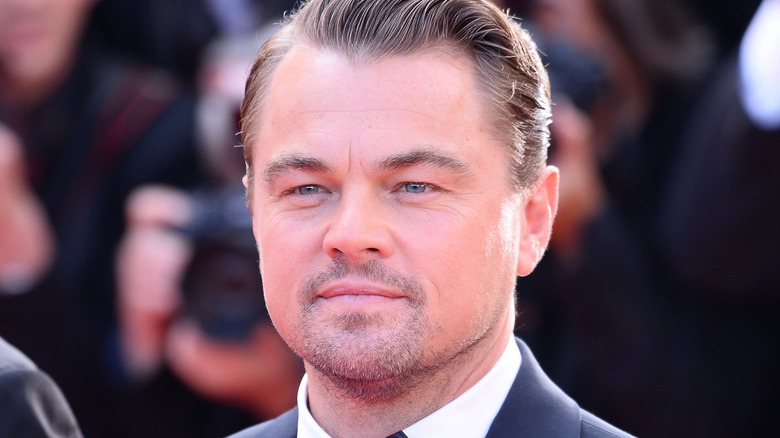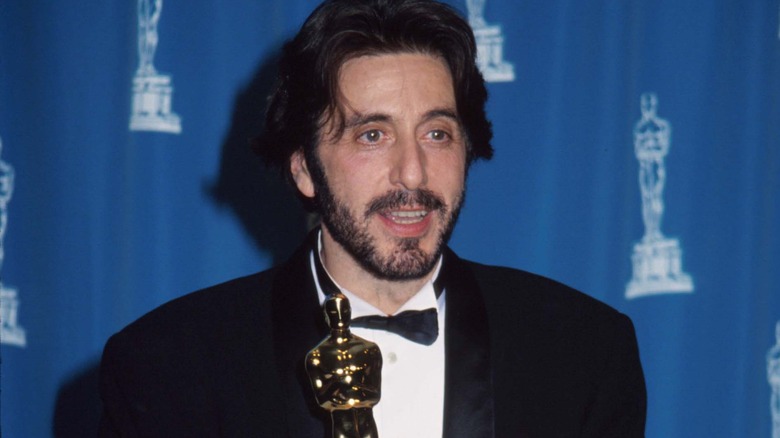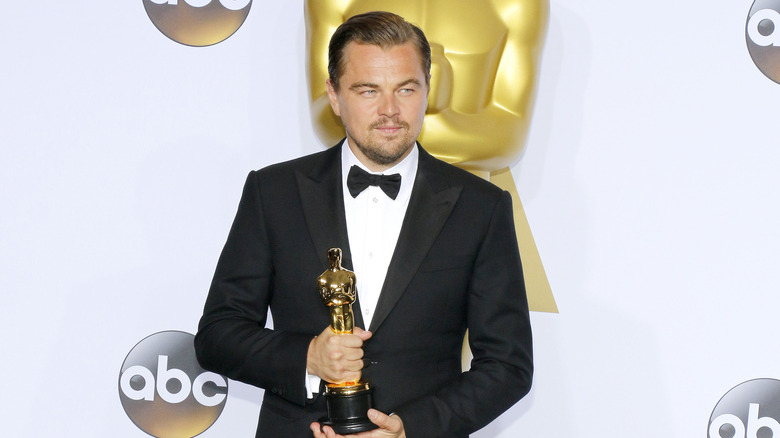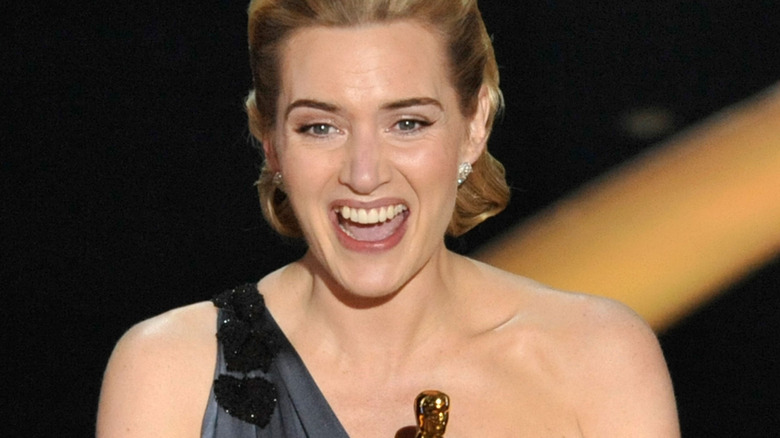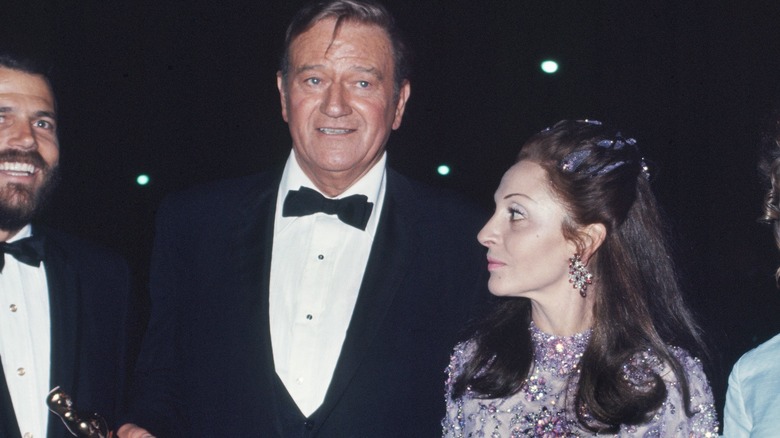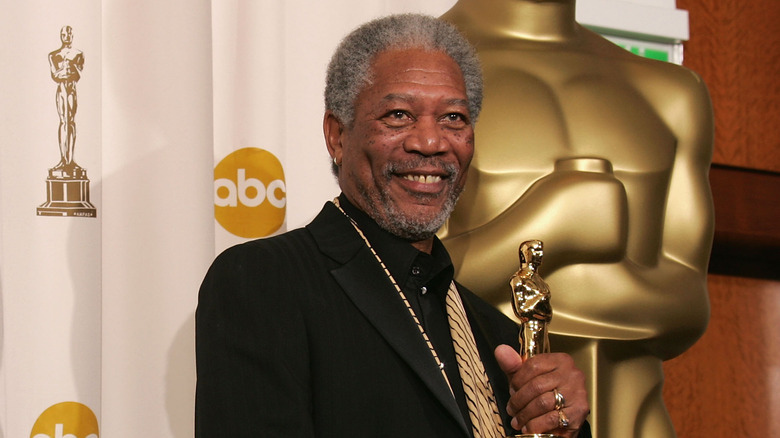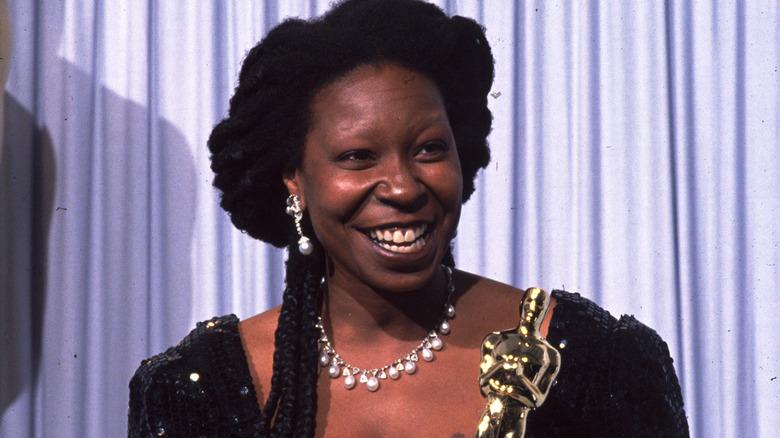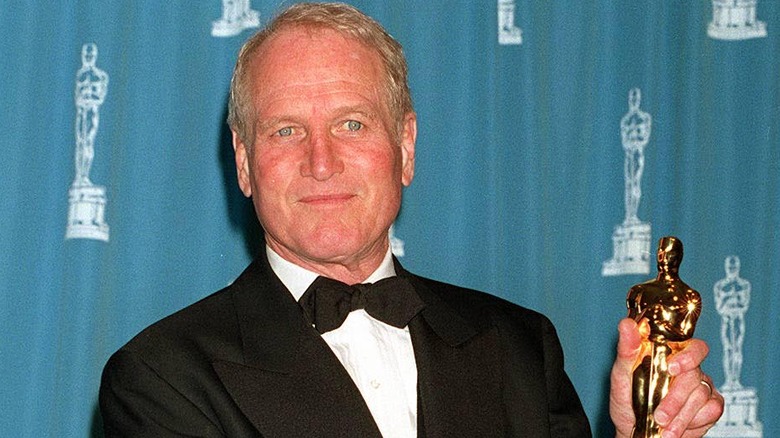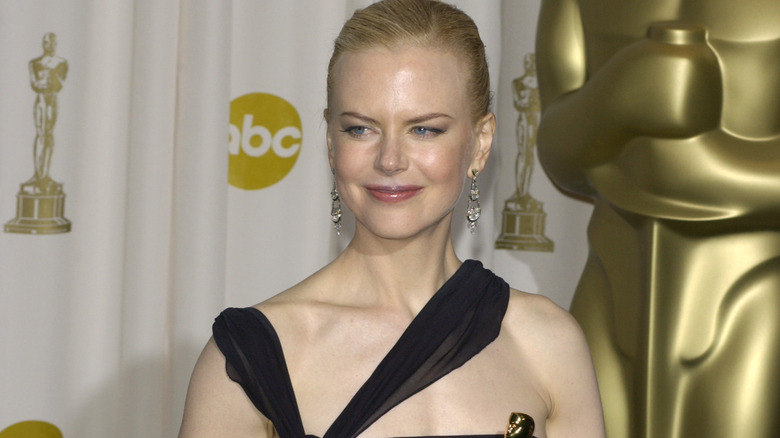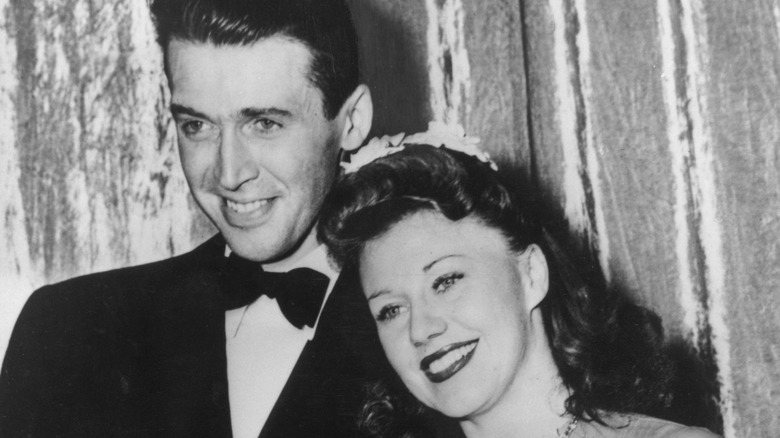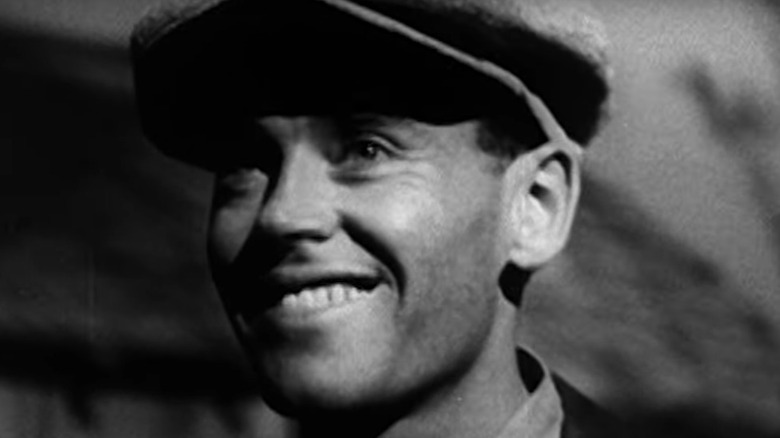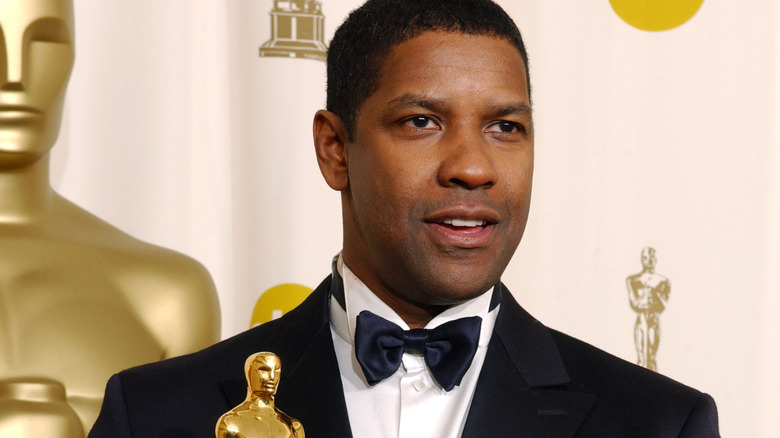Actors Who Wound Up Winning Oscars For The Wrong Movie
The Academy Awards offer an incredible platform for actors, artists, producers, and directors to recognize their peers for exemplary work in the field of motion pictures. Started way back in 1929, the program has handed out thousands of golden statues as a way to commemorate the best films, performances, and technical achievements of the year.
As is the case with any awards program, controversy seemingly rears its ugly head each and every season. Often an award will go to a seemingly underwhelming nominee, while others are outright snubbed despite their stellar work in the field. As such, many an article is written criticizing the Academy of Motion Picture Arts and Sciences for their poor choices, or blatant political motivations that sway them in one direction or another. In these instances, we don't fault the award recipient. Mistakes certainly happen, and all we can do is look back and lament what should have been.
There are numerous examples of talented actors receiving awards for performances that weren't up to par, while the Academy neglects the films that should have brought them the gold.
Al Pacino
Al Pacino has appeared in so many classic films that it's almost unfathomable to think the man has but one Academy Award to his name, winning in 1992 for Martin Brest's "Scent of a Woman" — a film in which the actor plays a blind, retired Army lieutenant colonel whose propensity for shouting "Hoo-ah!" was somehow endearing enough to warrant an astonishing number of accolades.
Considering his storied career features starring roles in the likes of "Serpico," "Dog Day Afternoon," and "Glengarry Glen Ross," we think it's darn near criminal that it took the Academy so long to give Pacino his just rewards. In point of fact, the iconic actor should have easily run away with the prize for his work in "The Godfather" way back in 1972, or "The Godfather Part II" two years later, both of which are often cited among the greatest films of all time.
"Scent of a Woman" is certainly a good film with a fine Pacino performance, but looking back it's strange that that was the role Academy members decided he deserved to be commended for. Not, you know, the legendary role of Michael Corleone, who stands at the center of Francis Ford Coppola's epic mobster series.
Leonardo DiCaprio
Leonardo DiCaprio became an instant heartthrob with Baz Luhrmann's "Romeo + Juliet" in 1996, but that status was truly cemented the following year, the moment he stepped aboard James Cameron's box office smash (and Best Picture winner) "Titanic." He could have easily made a career playing various iterations of his Jack Dawson character. Instead, the actor teamed with Martin Scorsese for a number of acclaimed projects, including "Gangs of New York," "The Aviator," "The Departed," "Shutter Island," and "The Wolf of Wall Street," on top of widely regarded turns in Steven Spielberg's "Catch Me If You Can" and Christopher Nolan's "Inception."
Despite his numerous turns in these challenging roles, the Academy ignored DiCaprio until 2015 when they finally tossed him an award for Alejandro G. Iñárritu's "The Revenant," where he mostly crawls around in a bear suit in the wilderness for two hours.
DiCaprio could have taken home the gold for his terrific portrayal of Howard Hughes in "The Aviator," but we think the Academy made a critical error when they failed to award the star for his incredible performance as Jordan Belfort in Scorsese's wildly entertaining "The Wolf of Wall Street." "Leonardo DiCaprio, playing Belfort, gives the first fully satisfying, elbows-out, uninhibited screen performance that I've seen from him," wrote Richard Brody in The New Yorker. "In 'The Wolf of Wall Street,' he leaves impersonation behind and unleashes spontaneous bursts of energy that seem to tear through the screen ... By being, more than ever, himself on-screen, DiCaprio realizes his role more deeply than ever before."
Kate Winslet
Kate Winslet has enjoyed an impressive career starring in films such as Peter Jackson's "Heavenly Creatures," Michel Gondry's "Eternal Sunshine of the Spotless Mind," Marc Forster's "Finding Neverland," and the stellar HBO drama "Mare of Easttown." However, despite her storied success, Winslet will likely always be remembered for her portrayal of Rose Dewitt Bukater in James Cameron's 1997 box office smash "Titanic," which went on to win 11 Academy Awards, including Best Picture.
Surprisingly, Winslet was snubbed for a statue by the Academy, who chose to award Helen Hunt for her admittedly terrific performance in James L. Brooks' acclaimed "As Good as It Gets." Winslet eventually won an Oscar years later for 2008's "The Reader" (an award that should have probably gone to Meryl Streep for "Doubt"), and her performance in that film certainly warrants attention. But "Titanic" was a cultural milestone that benefitted greatly from the actor's grounded turn as a young woman contending against the constricting norms of the early 1900s and fighting for her life when the doomed ocean liner hits an iceberg and eventually sinks to the bottom of the Atlantic.
No, the Oscars aren't measured by box office success, but in this case "Titanic" was a critical and audience darling that deserved more praise for the main thing that made people care — the performances of its star-crossed lovers.
John Wayne
Iconic actor John Wayne boasts 185 credits to his name, having appeared in any number of classic films and somehow only garnered one Academy Award — for his role as Rooster Cogburn in 1969's "True Grit." In fact, the legendary star earned just one additional nomination during his storied career, for the 1949 World War II drama "The Sands of Iwo Jima."
Really, though, the man should have received recognition for his terrific work in John Ford's 1956 epic "The Searchers." Wayne stars as hard-nosed, world weary Ethan Edwards, a man boasting all the classic visual trappings of the traditional western hero, but harboring a darker side driven by a genocidal sense of vengeance.
As noted by Roger Ebert, who proclaimed Wayne's performance as one of his finest: "Ethan Edwards, fierce, alone, a defeated soldier with no role in peacetime, is one of the most compelling characters Ford and Wayne ever created ... I think it took a certain amount of courage to cast Wayne as a character whose heroism was tainted."
Compared to his performance in "True Grit," in which Wayne plays a drunken U.S. Marshal who looks and behaves much like the other cowboy heroes in the actor's massive oeuvre, with an extra splash of eccentricity, Ethan Edwards stands out for his uniqueness — a dark and layered "hero" who could just as easily be interpreted as the film's main villain.
Morgan Freeman
We take Morgan Freeman for granted. The legendary actor has portrayed everything from an inner-city teacher in "Lean on Me" to a jaded detective in "Seven" to Batman's technical sidekick in Christopher Nolan's "The Dark Knight" trilogy. It's hard to believe he's earned just one Academy Award for his efforts — and in a supporting role no less — for Clint Eastwood's 2004 drama "Million Dollar Baby."
Really, though, Freeman should have won the Oscar a decade earlier for his towering yet measured performance as Ellis Boyd "Red" Redding in Frank Darabont's "The Shawshank Redemption." Of course, at the time no one paid much attention to the feel-good prison drama that co-starred Tim Robbins, based on the short story by Stephen King. In point of fact, Academy voters were drawn to the more popular (and showy) "Forrest Gump," and awarded Tom Hanks for his undeniably unique turn as Robert Zemeckis' titular hero.
Yet, all these years later and "The Shawshank Redemption" has emerged as a cultural phenomenon and is often considered one of the finest films ever made — recognition that comes in no small part thanks to Freeman's powerful presence. The actor practically carries the production on his sturdy shoulders and even narrates the film using his now iconic deep and commanding voice. Where "Forrest Gump" had the benefit of gimmicky special effects, nostalgia and a wicked soundtrack, the legacy of "Shawshank" lies first and foremost in the hands of its charismatic leading star. That has to count for something.
Whoopi Goldberg
In 1985, Whoopi Goldberg exploded onto the screen in Steven Spielberg's adaption of Alice Walker's novel "The Color Purple," a film that went on to earn 11 Academy Award nominations and ultimately walked away with zero wins. As if to say "mea culpa" for that oversight, the Academy saw fit to award Goldberg Best Supporting Actress for 1991's box office smash "Ghost." While we harbor no ill will towards Jerry Zucker's whimsical romantic melodrama — who doesn't long for a great pottery-based romance? — or Goldberg's comical turn overall (she's genuinely great in the film), "The Color Purple" is the type of star-making performance that warrants more than just scant praise.
In that film, Goldberg stars as Celie Johnson, a young woman who endures physical and racial abuse in early 1900s Georgia, but ultimately discovers the will to escape from her tortuous life. As noted by Roger Ebert in his Great Movies essay about "The Color Purple": "This was Whoopi Goldberg's first major performance, and remains her best, because she was allowed to draw from her inner truth and not required to play a sappy or comic role."
Ironically, the "sappy or comic role" she inhabits in "Ghost" is what eventually won Oscar voters over. Unfortunately, it also pigeonholed Goldberg into similar parts for the rest of her career.
Paul Newman
Paul Newman was snubbed often by the Academy, most likely due to his consistent brilliance. The man who once played Butch Cassidy racked up plenty of nominations for the likes of "Cat on a Hot Tin Roof," "The Hustler," and "Cool Hand Luke" (among others), but it wasn't until Martin Scorsese's 1986 feature "The Color of Money" (itself a 25-years-later sequel to "The Hustler") that Newman finally took home the grand prize.
"The Color of Money" is really good and Newman holds his own against a very young Tom Cruise, but his quiet, assured performance doesn't quite measure up against his earlier work.
If it were us, we would have given Newman the Oscar four years earlier for Sidney Lumet's classic 1982 legal drama "The Verdict." Newman chews on David Mamet's crackling dialogue with relish, portraying a washed up attorney who is given a second lease on life when he takes on a medical malpractice case and finds himself doing the right thing for a change. The film earned raves from critics and audiences alike and remains one of the actor's most memorable roles, but the Academy saw fit to award Ben Kingsley for Richard Attenborough's "Gandhi" instead.
Too bad, as Entertainment Weekly noted: "Newman's powerful turn walks the line between pathetic and sympathetic so well that you sit transfixed. He won an Oscar a few years later for 'The Color of Money,' but if you were presenting a case for Newman's legacy of acting brilliance, this film would be exhibit A."
Nicole Kidman
Nicole Kidman remains one of our very best actors, with incredible performances in the likes of "Far and Away," "Cold Mountain," and the recent "The Northman," among many others. In 2002, she hit pay dirt by starring alongside Meryl Streep and Julianne Moore in Stephen Daldry's acclaimed "The Hours," for which she was awarded an Oscar for her portrayal of Virginia Woolf.
Good on her, but we think Kidman should have run away with the Academy Award for her turn in Baz Luhrmann's 2001 musical epic "Moulin Rouge!" Kidman sings, dances and practically runs away with the production thanks to a career-defining performance that stands as one of the actor's most iconic to date. Of her role, Variety's Todd McCarthy wrote, "With her alabaster-and-flame look amplified by a scar of red lipstick and dazzling costumes, Kidman's Satine evokes screen goddesses from Dietrich to Garbo to Monroe, and the actress's own iconic status is exalted in the process."
"The Hours," by comparison, is mostly flaccid Oscar bait; a slow-moving, largely forgettable drama in which Kidman had the courage to adorn a prosthetic nose to hide her superstar looks. In point of fact, we think Julianne Moore deserved the prize over Kidman that year for her stellar performance in Todd Haynes' "Far from Heaven" — a likely result had Kidman won for "Moulin Rouge!" the year before.
Jimmy Stewart
It's hard to knock anything involving Jimmy Stewart. The man remains a shining example of the classic movie star thanks to a towering resume that includes the likes of "It's a Wonderful Life," "The Man Who Shot Liberty Valance," and "Vertigo," among many others. In 1941, Stewart took home his one and only (non-honorary) Oscar for the comedy "The Philadelphia Story," in which he starred opposite the great Katharine Hepburn and Cary Grant; and while we certainly enjoy the madcap comedy, the actor's performance isn't one that exactly screams Academy Award.
Even Stewart was shocked by the win. "I never thought much of my performance in 'The Philadelphia Story,'" the actor revealed in his biography, "Jimmy Stewart" by Marc Eliot. Indeed, the actor felt he should have won for "Mr. Smith Goes to Washington" the year before — a film that, in his mind, had more guts — and believed his win for "Philadelphia Story" was deferred payment for Frank Capra's classic political comedy-drama. In fact, Stewart felt Henry Fonda deserved the gold prize for "The Grapes of Wrath," and even voted for him!
We agree with Stewart's sentiments, and also concur that he should have received an Oscar for his stellar work in "Mr. Smith Goes to Washington," a role The Hollywood Reporter called the finest of the actor's legendary career.
Henry Fonda
We agree with Jimmy Stewart's assessment that Henry Fonda should have won the Oscar for his towering performance in "The Grapes of Wrath," one of the all time great films. Fonda stands at the center of this magnificent motion picture from director John Ford, crafting an idealistic movie character in Tom Joad. He is, as Roger Ebert noted, "so pure and simple and simply therein the role that he puts it over."
Alas, the Academy gave the Best Actor statue to Stewart and waited over 40 years to award Fonda for Mark Rydell's "On Golden Pond," in which he delivers a quietly powerful performance opposite Katharine Hepburn. Remarkably, Fonda only received two Academy Award nominations throughout his storied career and, ironically, earned an Honorary Award the year prior to winning his one and only competitive gold statue — itself seen by many, including the National Post, as a "pity Oscar" for a lifetime of work.
Not surprisingly, Fonda would only make one more film — the TV movie "Summer Solstice" — before stepping out of the spotlight. He passed away shortly thereafter in 1982. While it's great that the legendary star eventually received recognition for his work, the award was ultimately four decades too late.
Denzel Washington
Denzel Washington's early career saw him portray an assortment of good guys in films such as "Cry Freedom," "The Pelican Brief," "Philadelphia," "Crimson Tide," and "Courage Under Fire." Apparently, these performances weren't impressive enough to warrant anything beyond critical acclaim. Though, to be fair, Washington did win the Oscar for Best Supporting Actor for 1989's Civil War epic "Glory."
Even so, the Academy snubbed Washington on a number of occasions before the well-respected actor did an about face and took on the villain role in Antoine Fuqua's 2001 cop drama "Training Day." Washington is magnificent in the film and slides into the shoes of a corrupt detective with ease, but we think the Academy should have awarded the actor for his efforts in Spike Lee's "Malcolm X."
As explained by the New York Times in their review for the film, "In Denzel Washington it also has a fine actor who does for 'Malcolm X' what Ben Kingsley did for 'Gandhi.' Mr. Washington not only looks the part, but he also has the psychological heft, the intelligence and the reserve to give the film the dramatic excitement that isn't always apparent in the screenplay."
Al Pacino may have taken home the prize for his over-the-top performance in "Scent of a Woman" (a travesty we detailed earlier), but it was Washington who should have collected the Oscar for his turn as the outspoken Civil Rights leader — a weighty role that demonstrated the actor's astonishing skills nearly a decade before "Training Day."
Cate Blanchett
Cate Blanchett has accrued two statues for her impressive body of work, winning Best Supporting Actress in 2005 for Martin Scorsese's "The Aviator," in which she portrays the legendary Katharine Hepburn; and later Best Actress in 2014 for Woody Allen's "Blue Jasmine."
Still, we would rather the Academy had given her the award for 1999's "Elizabeth" rather than "The Aviator." As the titular Virgin Queen, Blanchett commands the screen and delivers an impressive performance that is equal parts powerful and heartbreaking. As explained by The Guardian, "Blanchett's triumph is to create a thoroughly convincing depiction of the journey from canoodling girlhood to the threshold of an imperial monarchy, battling her fears, shedding illusions, absorbing pain, learning judgment, turning anxiety into resolution, acquiring steel and sinew."
Surprisingly, the Academy opted to hand the trophy to Gwyneth Paltrow for the romantic comedy-drama "Shakespeare in Love" (one of many mistakes made at the 71st Academy Awards). If it were up to us, we would have given the award to Blanchett in 1999 and handed the 2005 statue to Virginia Madsen for her career-defining turn in "Sideways" — though, we still maintain Maria Bello (who wasn't even nominated) deserved Best Supporting Actress that year for David Cronenberg's criminally overlooked "A History of Violence." Either way, as good as Blanchett is in "The Aviator," her performance in "Elizabeth" is one for the ages.
